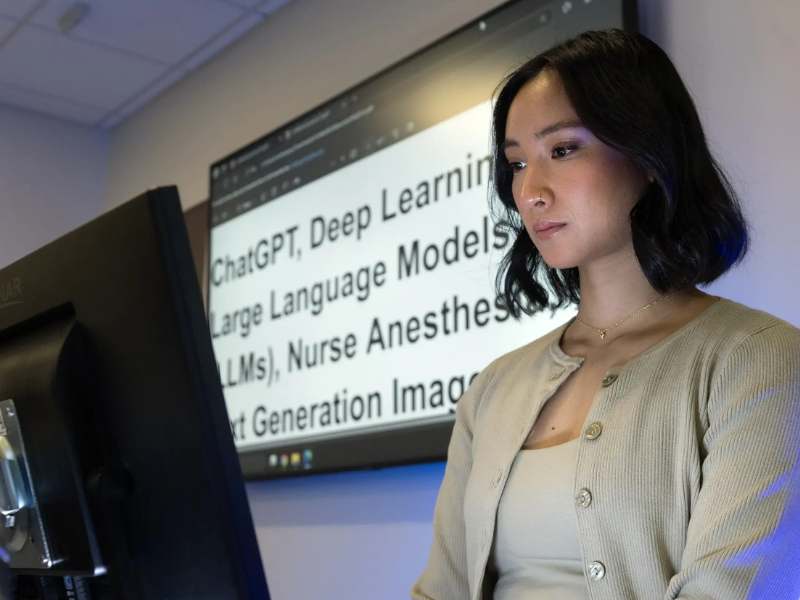How I found my research: Cayla Ann DeGuzman studies AI’s role in training for nurse anesthetists
March 26, 2025

As a researcher, Cayla Ann DeGuzman has managed to find a topic that marries her two favorite topics: technology and nursing.
DeGuzman, a student in the accelerated B.S. in nursing program in the Virginia Commonwealth University School of Nursing, previously earned a bachelor’s degree in computer science from George Mason University. In her research at VCU, DeGuzman is exploring generative artificial intelligence and its role in both academic and clinical practice for Certified Registered Nurse Anesthetist students in the College of Health Professions. The research experience has proved powerful.
“Finding meaning in others’ experiences and translating them into valuable insights has been incredibly rewarding,” she said.
DeGuzman, a Stafford, Virginia native, is due to graduate from the School of Nursing in December. In an interview with VCU, she shared the highlights and lessons of her research journey so far.
In two sentences, tell us the focus of your research ... and why it is important/impactful for all of us.
This research focuses on understanding the perceptions, knowledge, and training experiences of Certified Registered Nurse Anesthetist students in the Doctor of Nurse Anesthesia Practice program regarding generative AI, highlighting how they integrate AI tools into their academic and clinical practice. Its importance lies in identifying educational gaps and shaping AI-informed curricula to ensure future health care professionals are equipped to use AI responsibly and effectively, ultimately improving patient care and decision-making.
What inspired you to pursue this line of research?
During my computer science degree, I was always drawn to user experience and coding, which sparked my curiosity about the algorithms behind Generative AI tools. Now, as I pursue nursing, this research feels like the perfect intersection of my two passions — technology and health care. Studying how AI integrates into nurse anesthesia education allows me to explore both its technical underpinnings and its practical applications in clinical practice. Funnily enough, my interest in structured information started early — when I worked as a medical assistant, my physician assistant once called me a “human computer” for my precise notations!
Tell us about a surprise in your research journey.
A surprising discovery in my research journey came from analyzing student reflections on AI-assisted learning. While some students were initially skeptical about using generative AI, many became excited as they learned more about its capabilities and potential benefits. Instead of rejecting these tools, they expressed a strong interest in continuing to use them, highlighting both the need for structured AI training and the importance of addressing concerns about its limitations in health care education. Also, my appreciation for nursing has grown tenfold as I’ve seen firsthand the many different paths nurses can take — there truly is a niche for everyone, whether in clinical practice, research, policy or technology.
Tell us about an obstacle or challenge you had to overcome in your work.
One of the biggest challenges I faced was navigating my first large-scale research project and learning how to be an efficient researcher. Balancing data analysis, literature reviews and writing — especially the volume of writing required — was initially overwhelming. However, I developed strategies like organizing my research process, breaking tasks into manageable steps and refining my academic writing skills, which helped me stay on track and contribute meaningfully to the project.
Is there a memorable partnership or lesson you've embraced along the way?
One of the most valuable lessons I’ve learned is the importance of mentorship in becoming a researcher. I’ve had a great experience learning from faculty and peers, which has helped me grow both academically and professionally. I also didn’t realize how much impact I could have within my academic community until I became involved in policy work, like helping develop the AI policy for the nurse anesthesia department. Contributing to something that shapes the future of education has been incredibly fulfilling and has reinforced my passion for bridging technology and health care.
What do you find fulfilling about the research process?
I find the research process fulfilling because it allows me to make sense of complex ideas and contribute to meaningful discussions. I especially enjoyed coding student reflections, analyzing their experiences and identifying patterns that paint a bigger picture of trends in AI-assisted learning. Finding meaning in others’ experiences and translating them into valuable insights has been incredibly rewarding.
What advice would you offer undergrads to kick-start their own research journeys?
My biggest advice to undergraduates is: Don’t be afraid to start, even if you feel like you’re not knowledgeable enough in research. No one starts as an expert, and the best way to learn is by diving in. Choose a research topic that truly intrigues you or something you’re eager to explore — passion and curiosity will keep you engaged through the challenges. Most importantly, seek mentorship and ask questions; research is a collaborative process, and there are always people willing to guide and support you along the way.